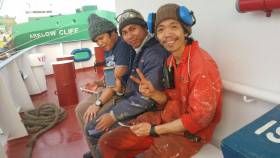Displaying items by tag: Working on Ships
Irish Tech Company Help Seafarers Connect to Loved Ones Over Festive Period
#Seafarers - Over three million seafarers, both men and women live in the twilight world of big shipping according to the Seamens Christian Friend Service (SCFS).
Seafarers are responsible for most of the goods you will of had acquired over the Christmas season. It's a lonely life and as such they don't get to spend Christmas with their family.
Crews roam the world's oceans for up to 12 months at a time. They come from more than 100 different nations and speak dozens of language. For most of them accessing the internet is synonym of keeping in touch with the family.
This year, SEA-Tech Evolution Ltd, an Irish IT company established in 2007, worked with the Port of Cork, Port of Waterford and Rosslare at improving crew welfare. The company take this service very seriously but it is sometimes hard to convince the shipping industry of the benefits of decent internet connectivity.
Commenting on the benefits of such technology, Arnaud (R.no) Disant, Engineer (CTO) at SEA-Tech and Lecturer at National Maritime College of Ireland, said you know you’ve done something good this year when you see a smile on the face of a man that truly values your work.
























































